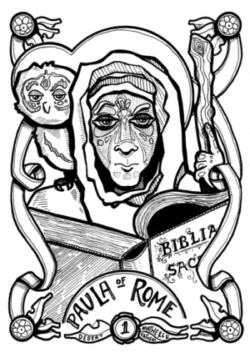November 4, 2015
Mysticism and Diversity: Lessons from a Van Flat
Spirituality
It took an experience of mysticism a few years ago for me to understand pluralism—the peaceful co-existence of different religions, theologies and spiritualities.
Once, while walking down a tree-lined street on a sunny, warm day in Marin County, I had that mystical experience of “oneness” with the Holy—the kind of experience you cannot bring upon yourself but can only submit to. It came in the midst of a struggle I was having as a seminarian about competing theologies. I didn’t really mind that they were competing. I did mind that some were claiming to be the only acceptable way of understanding God.
While pluralism is usually associated with different religions, it is apparent to any Christian who looks around and outside his or her own “brand” of Christianity that there are many different theologies living and moving within Christianity. The Bible itself holds evidence of competing theologies. Figuring out what to do with these wildly divergent views of God is not an easy task.
Many theologies
I was never one to think that all paths to God were equally wonderful—just pick one and move forward. Some, clearly, seemed to be life-strangling for people. Some paths seemed to be no path at all, at least not to enlightenment.
Still I bristled when certain (usually dead, white, male) theologians’ views were touted as superior to others for one reason or another—the reason usually being that one was more systematic than others. Systematic theology implies that it all elements tie together neatly with everything covered from “A” to “Z.” Whatever doesn’t seem to hold together is designated as mystery and students are told to simply “live in the tension.” I found systematic theology to be oppressive, arrogant and perfectionistic. Needless to say the theologies that were attractive to me were always accused of being non-systematic, and therefore inferior.
While walking, though, I saw—in my mind’s eye—Jesus telling me to give up that fight. Because all these different theologies are necessary to serve a purpose, and that what mattered was not my adherence to any one. What mattered was my becoming the person I was created to be. And helping others become the people they were created to be. It reminded me of the way a friend of mine sees his calling—“to be the face of Christ, assisting other people in taking the next step along their spiritual journeys.” Not to carve out a journey for them, but to assist them along the one that God was unfolding for them already, keeping in mind that for any one situation in life, there are many possible paths and outcomes. Each of us is wired in different ways to approach these situations differently.
The Seminary Van Incident
I was reminded of this recently as I pondered how a group of students from San Francisco Theological Seminary once handled a flat tire. Five of us were given a seminary van to take across the bay to a school in Berkeley where we had a pastoral counseling class. On the drive home at around 10 in the evening, the van developed a flat on a busy freeway in a part of the area known for having a higher than usual crime rate. What should have been a simple feat—changing the tire and moving on—became a clash of worldviews.
We had all become a little frightened because of where we had to pull over. One woman decided we needed to pray and attempted to make us hold hands and pray for help. Another said “this is ridiculous—what we need is to get out and figure out how to fix the flat.” The lone male of the group, being young and wanting to rescue us from fear, said he would run across the freeway to get help—an outrageously stupid idea that we did not allow him to entertain.
At the time, I was a weekend radio traffic reporter and I was highly sensitive to the dangers of being static on the shoulder next to fast-moving traffic. I also knew from experience that if we just “sat tight,” that someone driving along the highway would use their cell phone to call emergency services to help us. Which is eventually what happened, after we discovered that we had no jack, no spare tire, and no cell phone—in short no way to help ourselves or reach out for help in the immediate future.
This group response to mild crisis illustrates just how differently we all approach decisions in our lives. The woman who immediately wanted to pray was not wrong or silly to have that response (although we snickered at her then). She was a cancer survivor who believed in the power of prayer to heal and rescue. A few years later, she developed a brain tumor that seemed to respond miraculously to healing prayer. Who am I now to laugh at her for wanting us to pray?
The woman who preferred human action over prayer in this instance was not wrong to tell us to get to work. She’s spent many years working with people in dire poverty and knows the value of people putting their heads together and coming up with creative solutions. It’s not that she doesn’t pray—she just doesn’t pray in the same way as the first woman. She figures if it’s something God has given her the “know-how” to do, the prayer has already been answered so what are we waiting for?
The young man who wanted to cross the freeway was not wrong, at least not in his intentions. He wanted to be the one who fulfilled the action that was needed. He wanted to be the answer to our prayer.
And I was not wrong to suggest that we were pretty much whipped and needed to simply sit and wait. I knew that we wouldn’t be fixing that flat on our own—we needed help from the outside. Being a traffic reporter, I also knew that human nature is such that someone would want to help.
We all had a fragment of God’s wisdom in this crisis. Looking back on it, I see that each of us, with all our quirks and theologies and spiritualities are part of what makes God’s creation so lively and interesting.
It Takes All of Us
It’s what Jesus seemed to be saying to me on that walk—I need all of you, with all your belief systems and desires and understandings. I need the progressive and the conservative. I need the seeker and the mystic. I need the doubter and the one brimming with confidence. I gave each of you different eyes and hearts. I don’t expect you all to conform to one standard.
Jesus seemed to be saying, “I love you far more, as you are, than I could ever love your beliefs.”
That’s the moment I understood and embraced religious diversity.
If you are interested in learning more about spiritual direction or entering spiritual direction with me, please contact me at teresa@teresablythe.net or visit www.teresablythe.net. Also visit my website for the Phoenix Center for Spiritual Direction.
Photo credit: benuski / Foter.com / CC BY-SA




